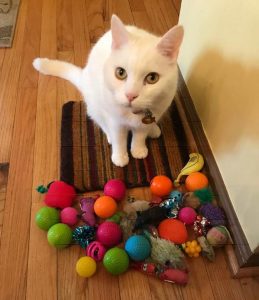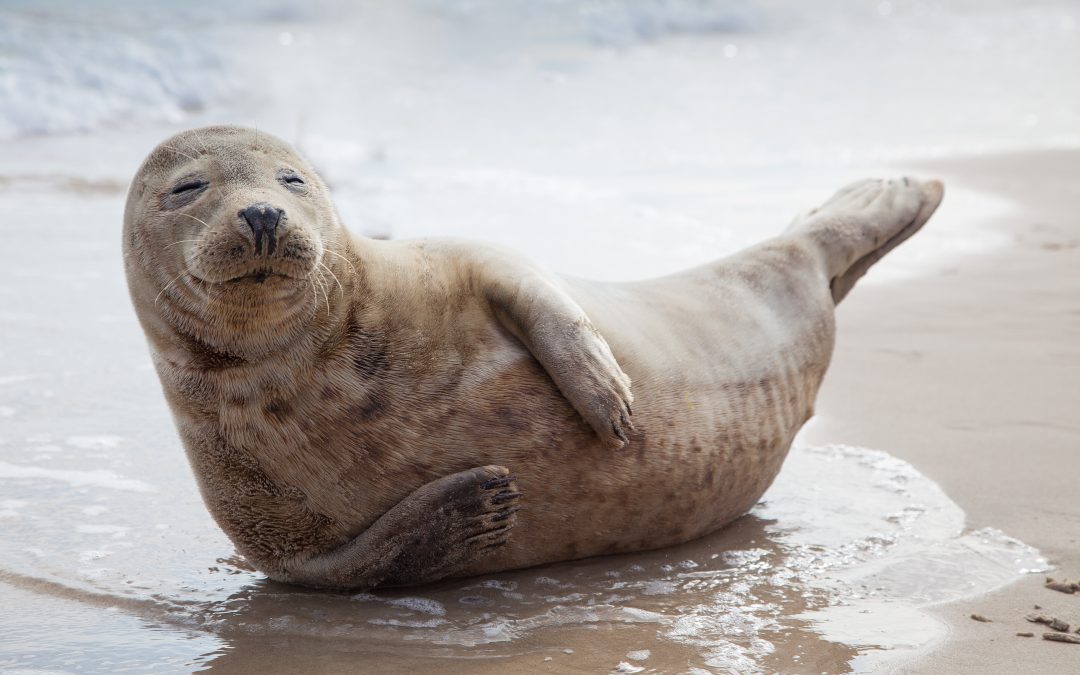It’s easy to believe animals live in the present when I watch my dog Stella completely devour her favorite dinner in less than 30 seconds.

She licks every spot of her bowl at least three times. Then she checks the floor around the bowl for scraps. But she’s not done.
Next, she waits (not patiently) for her buddy Tibor to finish his dinner. She then checks for any leftovers dabs of food that she can polish off in his bowl.
Total concentration. Nothing else matters.
And when animals play, they play with single-minded intensity.

When my cat Mac decides it’s time to chase the bouncy ball (yes, he’s a cat), he becomes a determined predator, insistent on catching and killing his prey bouncy ball. Nothing else matters at that moment.
I’m sure you have your own examples!
Animals and Mindfulness

Guess that’s why those who teach mindfulness suggest we look to animals. Animals, they say, show us how to live in the present. They’re much better than humans in living in the moment. They live in the Zen moment we want to achieve.
Yeah, but what about those other behaviors?
 I don’t think “animals live in the present” explains behaviors I’ve noticed.
I don’t think “animals live in the present” explains behaviors I’ve noticed.
As an animal communicator and an animal guardian, I see a much greater range of behaviors that tells me otherwise.
Animals think about the past and the future all the time. Here are a few stories.
A past decision is hard to accept
I met a dog (let’s call him “Barnaby”) who barked every day for hours. This went on for months. During our session, I “got” that he deeply missed a dog (“Sneaker”) who used to be in his life. Turns out he and his buddy were surrendered to a shelter (don’t know why). Someone decided they weren’t bonded and adopted them out separately.
When I told Barnaby’s guardian, she immediately began figuring out how to find Sneaker. She’s pretty sure she can make it happen, so we told Barnaby to relax, we got the message. He can stop barking (please). Got my fingers crossed that finding Sneaker will help Barnaby move on.
Worried his person was ready to pass on – cat story
Judy was concerned about her dog, Polly. That’s because Polly’s slow decline signaled she was heading towards the end of her life. This affected Judy’s cat, Ringo, but it had a surprising twist.
When Judy left for a cruise to Alaska, Ringo stressed out with urinary tract issues. After Judy got home, we checked in with Ringo through animal communication.
Ringo picked up on Judy’s worry about Polly. Unluckily, he thought Judy may have transitioned when she left. It shook him up.
We helped Ringo release that worry (energy healing) and his urinary problems cleared up. But he still watches out for Judy’s wellbeing, so we asked him to find Judy and get some more love and reassurance whenever he stresses.
They grieve the past and worry about the future – dog story
Another dog (let’s call him “David”) recently lost his human, Grandma. He lived with Grandma and her daughter, “Pam.” Grandma totally loved David and was with him 24/7. Some months later, Pam got very ill from food poisoning and spent almost a week in the hospital. David started barking, which was new (and unwelcome) behavior.
When I connected with David, he was scared he was going to lose Pam. His barking said, “I lost Grandma and I thought I lost you, too, Pam! Don’t you leave me!” He also stopped eating three days before our session.
So I shared that Pam was going to be home as much as possible, even though she had to work. We talked about how hard it was for both of them to lose her Mom.
I asked David to start eating again, reminding him that Pam needed him to stay on the planet. Pam told him he’d feel better physically, have more energy. I quietly asked Grandma to help since she loved him so much. I asked her to whisper in his ear and ask him to eat.
Pam reported that he ate all the food she put in front of him when they got home from our session.
They have a hard time letting go of the past

Those of us with animals who have a tough past see this. Those memories/experiences affect their ability to enjoy life. Some are anxious and fearful, some guard their resources (food, toys). In others, there’s anger. They may not trust humans. Even when they’ve left the bad old days behind, they have quirks that don’t go away.
“Is Everything in a Dog’s Life Pretty Short-Lived?”
Read this great article by Marc Bekoff, Ph.D., professor emeritus of Ecology and Evolutionary Biology at the University of Colorado, Boulder, and co-founder with Jane Goodall of Ethologists for the Ethical Treatment of Animals. It counters the “animals live in the present” belief so well.
Hope for all animals
I read a great article about what happened to Michael Vick’s dogs – the ones rescued from his dogfighting ring in 2007. Rather than be euthanized, 47 dogs were given a second chance! A bunch moved on to happy lives with families. But some were never able to be safely rehomed; they were not safe with other dogs or people. The good news is even these dogs were given a good life at sanctuaries.
Here’s a quote from this great article.
“When Vick’s dogfighting operation was broken up, animal rescues from around the country understood the gravity of the case but also the opportunities it presented because of the NFL star’s fame. Eight organizations received custody of the animals. Some groups placed a single dog into a foster home. Best Friends agreed to give the 22 most challenging cases a place to recover and, for some, a permanent home.
“The organizations worked to redefine what made a dog adoptable. The dogs were seen as victims, not irreparably damaged. They weren’t just pit bulls or fight dogs. They became Mya and Curly, Frodo and Zippy.”
“‘Michael Vick brought dogfighting into the living room of every American,’ said Heather Gutshall, who adopted Handsome Dan and later founded a rescue organization that aims to help survivors of dogfighting. ‘Am I glad it happened? No. Am I glad, that if it was going to happen, that it happened the way it did? Absolutely. They changed the landscape.’ “
Read “A Second Chance” by Emily Giambalvo.
The pitfall of “Animals Live in the Present” revealed
Once we let go of “animals live in the present,” we see them as complex beings. From there, we receive insights that can help everyone move forward. We see who they are and what motivates them.
That’s one of my deepest joys of animal communication. When people know what’s going on with their animal, their hearts open, they figure out what’s needed and healing happens for everyone.
Find out what’s going on with your animal!
Do you have stories about how your animals’ past affects them or how they think about the future? I’d love to hear them!

